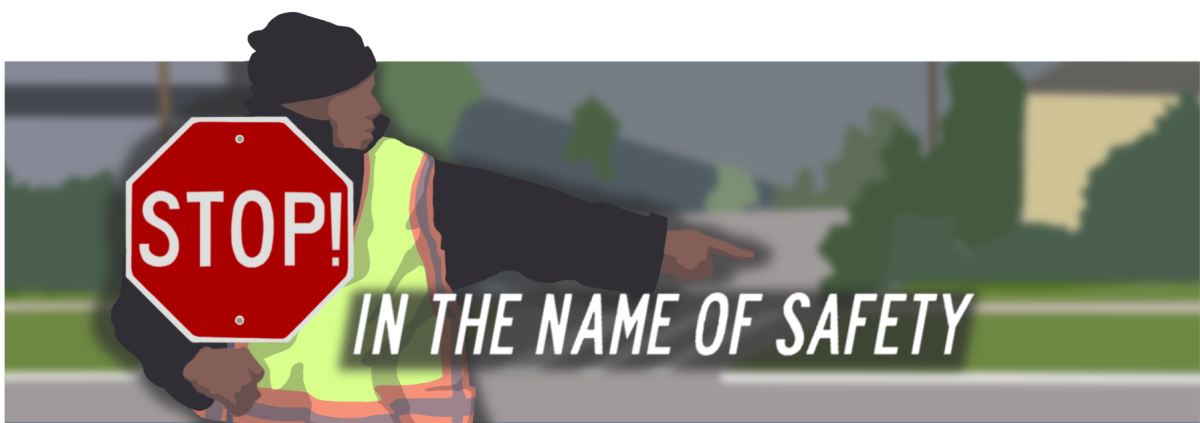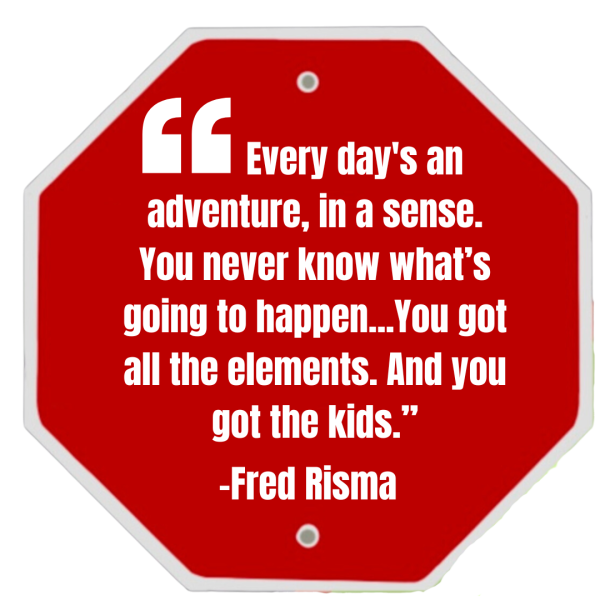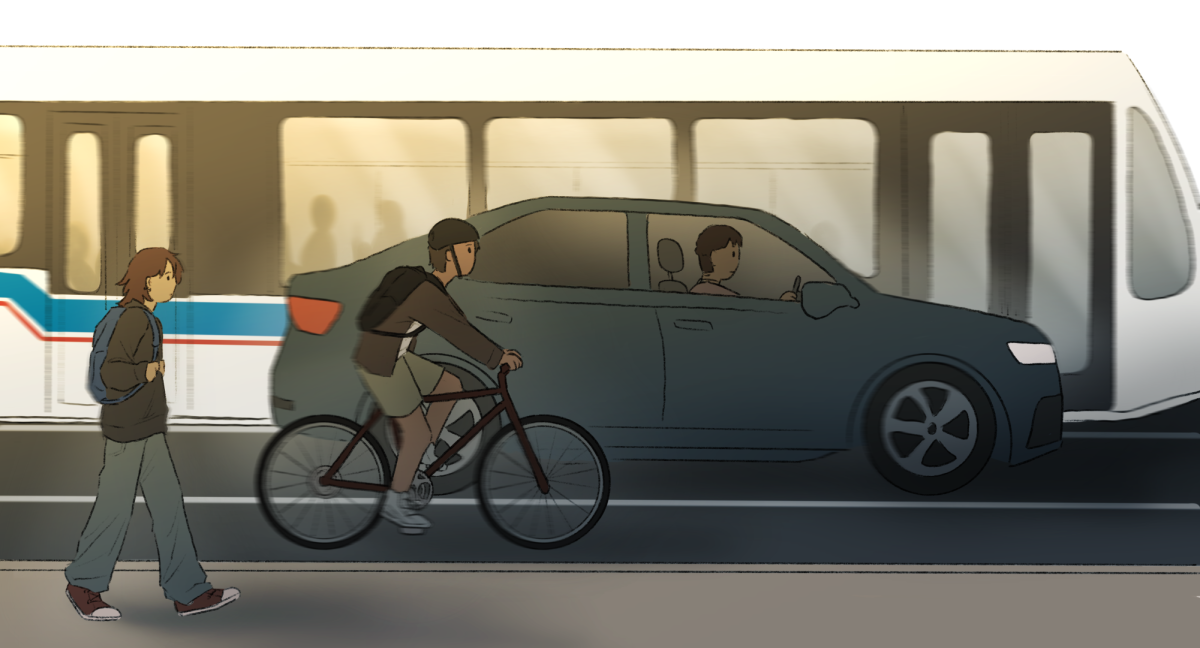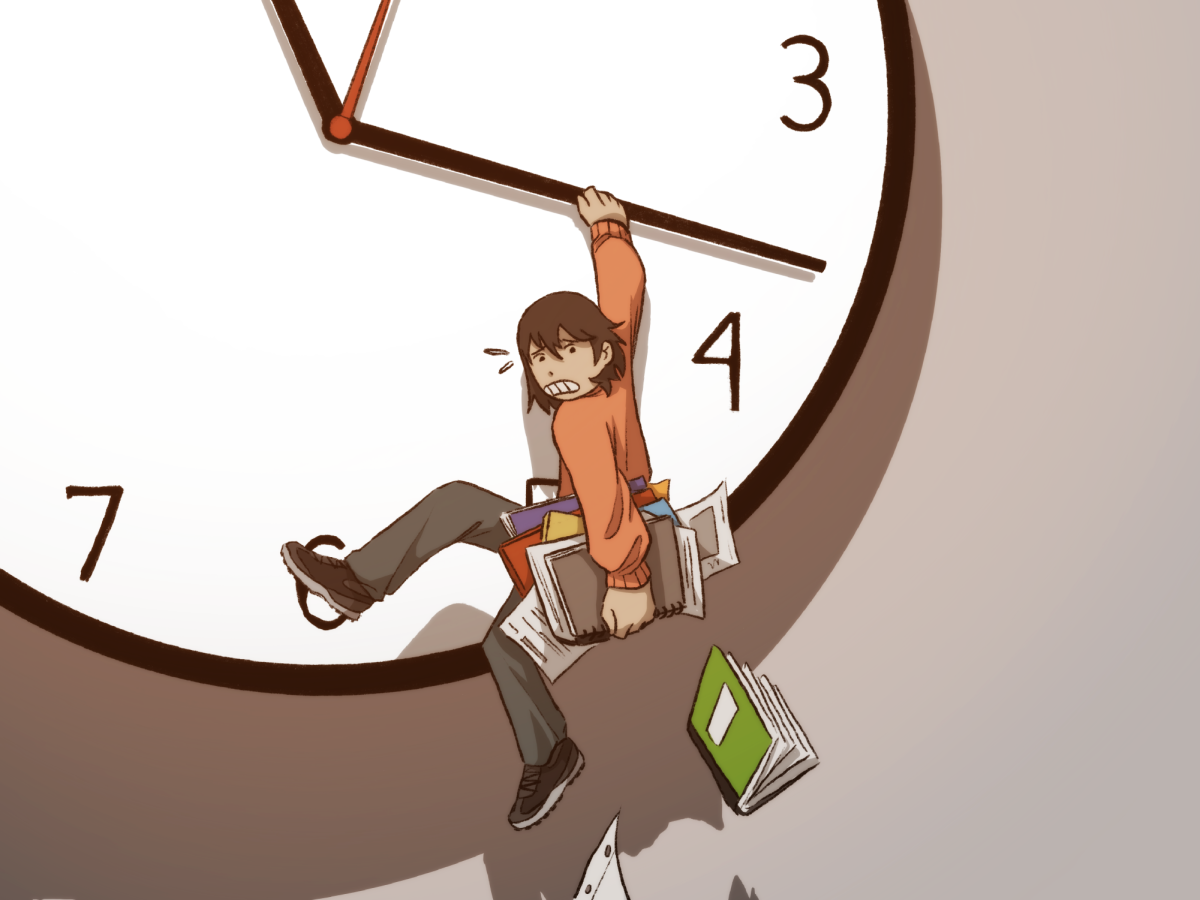
At 8:05 a.m., traffic crawled to a stop just outside of entrance one. Students dart out into the street, shielding their eyes from the rain, and the most palpable sounds are the squeak of windshield wipers and sneakers slick from the downpour. Headlights cut through the dark, damp morning, and illuminate the large red sign that’s holding everyone up. On another morning, it’s nearly a blizzard, and the bright green vest is stretched across a thick winter jacket. The snow steadily sticks to the ‘STOP’ sign when it’s lifted in the middle of the street, blurring into the tops of the white word, its indication still known. No matter the weather, the time or the traffic, the guard ensures that everyone crosses the street safely.
79-year-old Fred Rimsa has been a crossing guard for the past 14 years. After retiring in 2009, Rimsa found he still wanted something to fill his time. Having always harbored an enjoyment for being outside, being a crossing guard seemed like a great way to be able to help the community and do something he enjoyed. So when the opportunity arose, it was not one he could pass up.
“I always liked being outside, getting up in the morning,” he says. “Just being there when the sun comes up, it’s a really good feeling. It doesn’t feel like work at all.”
Rimsa often gets up early to do the morning school shift, stays late for when the students get out, and guards for multiple different schools in a day. According to him, not every day is the same—some days he’s in Skokie, other days he’s in Evanston. The shifts themselves range from between 40 minutes to an hour and a half, they’re often back to back—an hour at one school to an hour at another. Over time, the work is taxing, but Rimsa finds the best in it. 
“You can be on your feet quite a bit,” he says. “But the way I look at it, I’m getting physical therapy, and I’m getting paid for it. And I enjoy it.”
Between extreme weather, uncooperative drivers and unpredictable kids, the work is not without its challenges. Whether it’s raining, snowing or 80 degrees, the guards must remain at their post for as long as they’re assigned, and withstand the conditions.
“Every day’s an adventure, in a sense,” Rimsa says. “You never know what’s going to happen. Oh, you got rain, you got snow, you got heat, wind. You got all the elements. And you got the kids. It can be boring and it can be challenging, but it can be fun.”
But the biggest obstacle is people. Rimsa emphasizes that it is a state law in Illinois that if people are at a crosswalk, the drivers must stop. In his experience, despite being in front of a school as children are leaving it, many disregard that rule.
“From the minute you get on the corner, you have what seems to be a complete lack of disrespect for traffic laws,” Rimsa says. “Quite a few people don’t care who or where you are, all they want to do is get through. They will cut in front of you, behind you, so you have to keep your eyes open all the time. If some [drivers] have the opportunity, whether there’s kids there or not, they will make the turn. So you have to watch the traffic, watch the kids, watch the stoplight.”
“But,” he adds, “that’s what makes it interesting. Some corners you could fall asleep standing up.”
With the challenge of hazardous weather and people aside, Rimsa takes pride in his work. Being a crossing guard allows him to equate himself with the community. After over a decade in his role, he’s established connections with students, pedestrians, and whoever else walks past his corner.
“I’ve had people bring me hot chocolate and hot tea in the winter, cold drinks if we’re in the sun,” he says. Beyond drinks, he’s received gift cards, homemade food and other small tokens of appreciation.
Rimsa isn’t the only one who takes great pleasure in his job. Deborah Clarke has been a crossing guard since she moved to Evanston 34 years ago, and she looks forward to standing guard at the corner every day.
“I have seen kids come up, and [now] I’m taking care of their kids,” she says. “I wake up every morning with a smile on my face, excited to see the kids. Nobody’s ever seen me with a frown on.”
Clarke has consistently gotten up at 5 a.m. for her job as a crossing guard. While Rimsa’s day to day is more unpredictable, Clarke’s schedule has more consistency. At 7:45 a.m. she begins guarding at King Arts, where she stays until around 8:15. From 8:15-9, she does the crossing at Washington before going inside and beginning her work as a cafeteria lady. After the elementary school students leave for the day, Clarke comes to ETHS for the late shift. She often does not return home until past 6 p.m. But her long hours are worth it, she says.
“I love being a crossing guard. I love being out there, with the kids,” she says. “When it comes down to the kids, I take everything serious.”
Growing up on the west side of Chicago, Clarke didn’t have the best school experience. She struggled with a reading disability throughout her education and gives a lot of credit to her late mother for helping her succeed despite it. Her mother worked in the after school program at Clarke’s school and played a large role in inspiring Clarke to pursue her career as a crossing guard.
“I did everything I was supposed to be doing. [My mom] did the best she could, and I just followed in her footsteps. I’m just trying to be a good role model,” she says. “I want all kids to go to school and get an education. That’s why I do what I do. I want [every kid] to be able to have an education and come to school with a positive attitude.”
As important as crossing guarding is, the job is not without its faults. Both Clarke and Rimsa have jobs aside from being a guard—Rimsa works for the Skokie Park District and Clarke works as a cafeteria lady at Washington and Oakton, as well as at the farmers market in the summer and the district building, where she washes dishes.
The average wage for an Illinois school crossing guard is $15 per hour. Both Clarke and Rimsa have families that they provide for, and living on this wage alone is not enough for them to sustain comfortable lives. While both enjoy the work they do beyond being a crossing guard, it’s not something that’s realistic for everyone.
“I have never missed a day of work,” Clarke says. “In all my jobs, I never took a day off of work.”
Crossing guards play an essential role in the safety and protection of students every day. Whether it’s before or after school, or in the middle of the day, the guards act as a figure of reliability as they stand on their corners come rain or shine. They deal with difficult drivers, risky weather conditions and the volatility of small children. They not only deserve to be properly compensated but to have their work appreciated by the people they keep safe. Nevertheless, Clarke and Rimsa aren’t in it for the recognition or the pay, but because it’s what they love.
“I really can’t say anything more because this is what I love doing. I [just] feed the kids and do my crossing,” Clarke says. “This is what I wanted to do—be a crossing guard.”














Beth Ann Brand • May 3, 2024 at 9:24 am
I’m always in awe of the crossing guards at ETHS. In awe and thankful! I hope they enjoy their well-deserved summer break. What a great story.